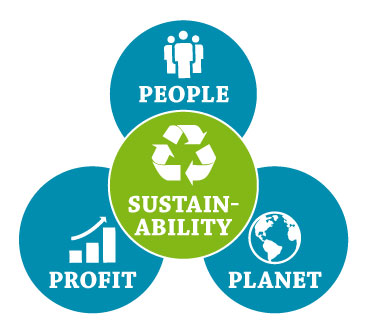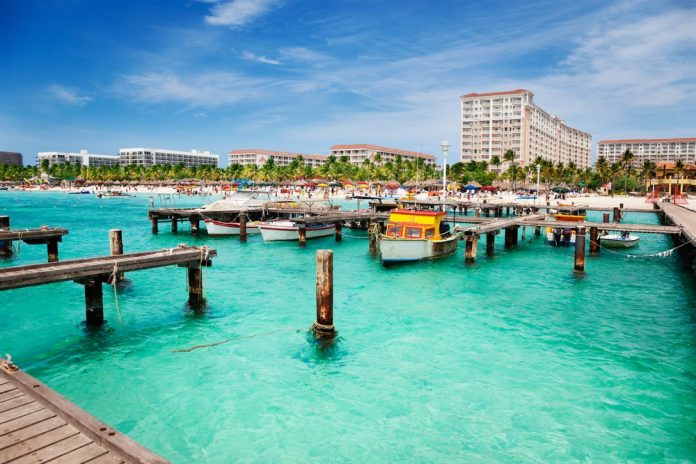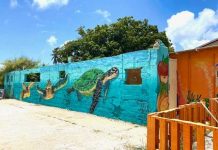It has not been a secret that Aruba is experiencing though situations related to the migratory crisis of its neighbor country, Venezuela. The CEO of the Aruba Tourism Authority (ATA), Ms. Ronella Tjin Asjoe – Croes stated that the Venezuelan market, which alongside the North American market (USA and Canada) were the major touristic markets visiting the island, is currently considered to have a dormant status. This shift was thankfully consolidated with the increasing demand of the North American market, which allowed Aruba to maintain and continuously grow as one of the leading touristic destinations in the Caribbean. However, besides these developments, the discourse has been very strong within the Aruban community on what the tourism industry will mean for the island as we consider the demotivating evolvement of the oil refinery industry, and the increasing attention to the environment and the Aruban natural heritage. The island is torn on the issue, not knowing if tourism should expand, be limited or maintained as is.
The government of Aruba and ATA have both expressed that one way we could diversify within the tourism industry is to venture into other niche markets, such as cultural tourism, medical tourism, adventure tourism, eco-tourism etc. In the report “Cu Mira pa Futuro” in 2017 (With an Outlook to the Future) the ATA shared their strategic objectives as desiring a balanced development, increasing the economic value of tourism, developing a sense of place, developing an innovation mindset and increasing community engagement. From an incubator session between the University of Aruba (UA) and the Educacion Profesional Intermedio (EPI) in 2017, key areas of concern for Aruba as a destination include, the lack of innovation, other developments, the business climate, safety and the lack of culture. Also, from town hall sessions in San Nicolas in 2017, it seems that 87% of the community does not want further development of hotels on the island, 98% of the community does not want more all-inclusive hotels on the island, and 92% of the community does not want further time share development of the island. However, 73% would like to see the development of boutique hotels on the island. Considering the exit survey ATA executes, only 1% of the tourists spend on local arts and culture, which is can be considered low, or just an opportunity to expand and attract a market of people who want a cultural experience rather than laying on the beach their entire stay.
 Furthermore, between the Aruban community together with all relevant stakeholders, the goal will be to invest more in education, innovation and entrepreneurship; more efficient infrastructure planning; more protection of the Aruban natural heritage; protecting Aruba’s main assets (beaches, hospitality and safety); creating a sustainable mindset; more collaboration on policy; increased cultural curiosity and creative confidence; and more transparency and social dialogue. Moving into 2020, the “Cu Mira pa Futuro” report, highlights the focus on sustainable tourism. For sure a topic that has been discussed in the community and recently by the Raiz Political Party, which is related to the carrying capacity concern, or over tourism dilemma. But, what exactly is sustainable tourism? Is sustainable tourism even achievable or realistic? Personally, I think many people confuse sustainability with being only environmentally friendly. Environmentally friendly development can be sustainable; however, sustainable development does not always mean it is environmentally friendly. Sustainability is broader than just the environment and can be explained through the sustainable development goals (SDGs) by the United Nations, targeting 17 goals by 2030 for a better and more inclusive world.
Furthermore, between the Aruban community together with all relevant stakeholders, the goal will be to invest more in education, innovation and entrepreneurship; more efficient infrastructure planning; more protection of the Aruban natural heritage; protecting Aruba’s main assets (beaches, hospitality and safety); creating a sustainable mindset; more collaboration on policy; increased cultural curiosity and creative confidence; and more transparency and social dialogue. Moving into 2020, the “Cu Mira pa Futuro” report, highlights the focus on sustainable tourism. For sure a topic that has been discussed in the community and recently by the Raiz Political Party, which is related to the carrying capacity concern, or over tourism dilemma. But, what exactly is sustainable tourism? Is sustainable tourism even achievable or realistic? Personally, I think many people confuse sustainability with being only environmentally friendly. Environmentally friendly development can be sustainable; however, sustainable development does not always mean it is environmentally friendly. Sustainability is broader than just the environment and can be explained through the sustainable development goals (SDGs) by the United Nations, targeting 17 goals by 2030 for a better and more inclusive world.
The Tourism Industry and the Sustainable Development Goals (SDGs)
According to the “Tourism and the sustainable Development Goals Journey to 2030” report by the United Nations World Tourism Organization (UNWTO) and the United Nations Development Program (UNDP) (2019) “in the context of the universal 2030 Agenda for Sustainable Development and the Sustainable Development Goals, the International Year supports a change in policies, business practices and consumer behavior towards a more sustainable tourism sector that can contribute to the SDGs in five key areas, namely: (1) Sustainable economic growth, (2) Social inclusiveness, employment and poverty reduction, (3) Resource efficiency, environmental protection and climate change, (4) Cultural values, diversity and heritage, and (5) Mutual understanding, peace and security”. The report defines sustainable tourism as “tourism that takes full account of its current and future economic, social and environmental impacts, addressing the needs of visitors, the industry, the environment and host communities” (p. 15). This means that sustainable tourism has both a socio-economic and environmental ideology. Threats and challenges in tourism will require comprehensive and rigorous public policy at a national level, while recognizing tourism’s value in advancing and even accelerating implementation and achievement of the SDGs. In the end, the sustainability specifically of the tourism private sector depends to a large extent on “a supportive policy framework, as well as financing, that would enable and incentivize small and large companies to develop business models that foster inclusive green growth. The tourism private sector thus requires integrated policy actions and strong partnerships that support and guide businesses in those areas where voluntary action is not sufficient to achieve the SDGs” (p. 39).
Local examples of Cultural Tourism
 The tourism and cultural sectors have emerged worldwide as leaders in the revitalization of redundant buildings and open spaces for contemporary purposes, providing opportunities for sustaining traditional and contemporary cultural values (UNWTO, 2019). One interesting example of such activities include the entertainment and music industries, which have gained much attention on the island, through the known festivals such as the Aruba Electric Festival, Aruba Summer Music festival, Soul Beach Music Festival, the Caribbean Sea Jazz Festival, which was recently in the news for being cancelled due to not meeting targeted touristic attendance. Next to these prestigious festival, during July 17th till 27th 2019, Aruba will host the ‘Aruba Symphony Festival & Academy’ where more than 100 musicians from all over the world come to participate, contributing to the cultural and touristic development of Aruba.
The tourism and cultural sectors have emerged worldwide as leaders in the revitalization of redundant buildings and open spaces for contemporary purposes, providing opportunities for sustaining traditional and contemporary cultural values (UNWTO, 2019). One interesting example of such activities include the entertainment and music industries, which have gained much attention on the island, through the known festivals such as the Aruba Electric Festival, Aruba Summer Music festival, Soul Beach Music Festival, the Caribbean Sea Jazz Festival, which was recently in the news for being cancelled due to not meeting targeted touristic attendance. Next to these prestigious festival, during July 17th till 27th 2019, Aruba will host the ‘Aruba Symphony Festival & Academy’ where more than 100 musicians from all over the world come to participate, contributing to the cultural and touristic development of Aruba.
According to other news sources, the founder and musical director of the festival expressed that what distinguishes this festival to the others is the diverse multicultural aspect of not only the musicians, but also the music performed, which will include folk music, Latin American music, and also more classical music of for example, Beethoven. Accessibility will not be an issue, seeing that only the first and last presentation will have an entrance fee. To make sure the entire community of Aruba can enjoy the festival, the presentations between July 18th and 26th 2019 will be completely free and will be hosted on popular local venues, such as Cas di Cultura, Paseo Herencia, Casibari, Ritz Carlton Hotel and the Free Winds. So, if you are on the island during these days, make sure to experience a local symphonic experience.
There is no question that the tourism industry of Aruba will need to include creativity, culture and innovation to accelerate more sustainable tourism on the island. How this will look like, we don’t know. Will our tourists continue to experience Aruba as they know it to be? We don’t know either. But, what we can conclude is that the island will not escape tourism as its primary income for the years to come. Sustainability should be our priority, and effective public policy will be instrumental for creating proper development and accountability of all stakeholders involved. It will be a matter of time to see either positive or negative development impacts. Aruba, its community and its visitors deserve sustainability, not only for the present, but for the future.















